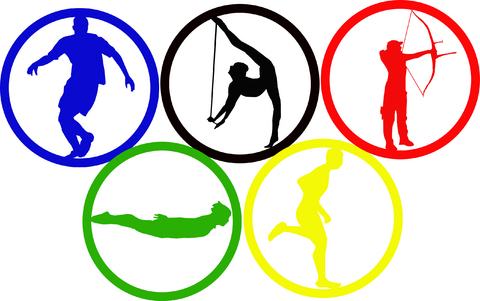
I’ve never been a particular sports-lover, but I have always loved watching the Olympics. Part of the reason is, surely, that the US network coverage of these events is specifically designed for people like me: people who aren’t very knowledgeable about sports, who might have trouble visually interpreting the events on their own in a way that is in any way interesting. So NBC stitches in some narrative storytelling so the undisciplined viewer (cough, me) has characters to meet and grow to love, plot arcs to follow, and plenty of dramatic tension to fret over.
Stepping back and looking at the Olympics from a more long-term vantage, I realize part of the attraction is also the grander narrative that piles up over time and years. Every two years, we take two weeks out of our lives to sit on the couch and contemplate another city, another set of athletes, and what about our own life and aspirations has changed since last we thusly sat and contemplated. My life is marked by Olympics, and I have very vivid memories tied to watching Olympics—where I was, who I was with, what I felt, and now, in retrospect, what that all says about my life.
This theme was really brought home to me by a lovely essay by Karissa Chen entitled “Of Grace and Gold (A Personal Retrospective on Michelle Kwan),” which was just published in the inaugural issue of the long-form sports writing magazine Some Call It Ballin’.
In the Googling rabbit hole that happened to me after I read the essay, I encountered this Slate compilation of Olympics-related long form journalism. Slate ran this piece in 2012, before the Summer Olympics, so it’s not as chilly a list as one someone will surely come out with over the next few weeks, but is is an excellent reminder of how much greater narrative there has been around the Olympics over the last long century.
And for even longer form narrative, allow me to highly recommend a Soho novel, Andromeda Romano-Lax’s The Detour, which is set just after the Nazi-era Berlin Olympics of 1936 and draws on the German eugenic movement.
***
Every two years I spend two weeks of my life thinking about the things NBC rightfully suggests will be emotionally provocative to me: patriotism, personal struggle and triumph, culture and national identity. As I get older (and, maybe, I hope, a little bit smarter) I also think about less attractive narratives, like colonialism, capitalism, and military-industrial complex politics.
I get increasingly frustrated with how the network selects and interprets narratives for us. I “love” spotting the maybe-accidental underlying racism and xenophobia in so much of the mainstream commentators’ language choices. (Remember how much “dishonor” the summer Olympics commentators feared the Japanese men’s gymnastic team would face when they returned home with only a silver medal? Anyway.)
This year, I probably won’t watch very much televised coverage at all. I have some half-baked thoughts about the ethics of watching on a US network the ethically questionable coverage of a politically controversial sporting event in which real athletes fighting for the moment of their whole careers. What is the appropriate response of a progressive patriot who likes a good bootstrap/epic sacrifice/success narrative? Well, since the two weeks of the Olympics happen to be packed with other commitments, I won’t have to think things through to hard. I won’t have time to watch anyway.
However, I would welcome more long-form on the topic.